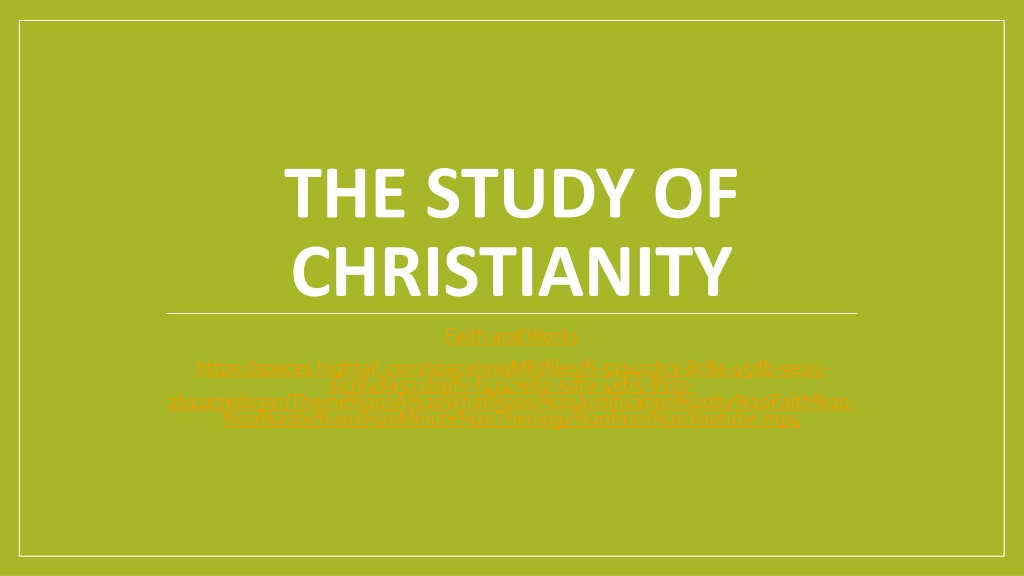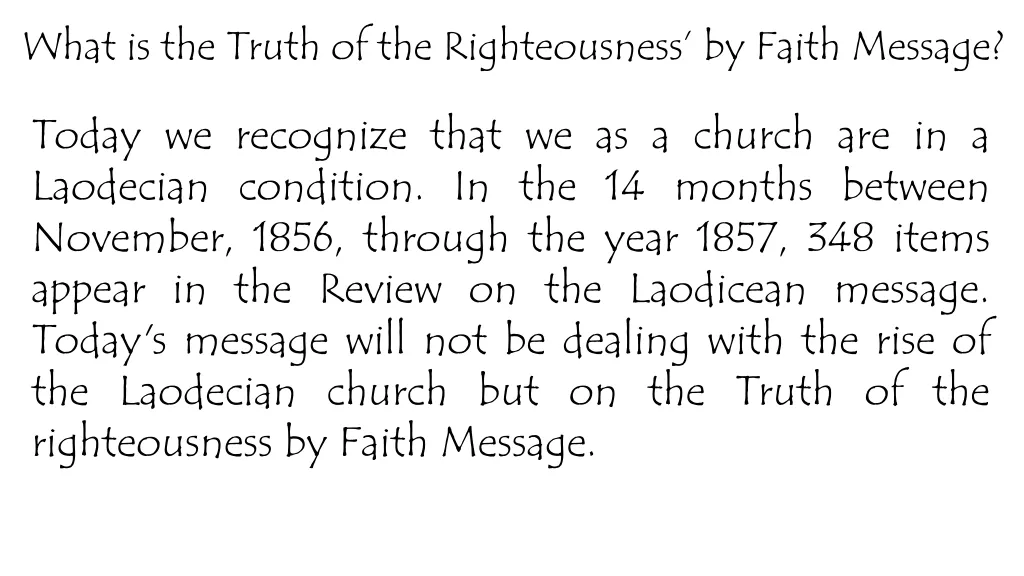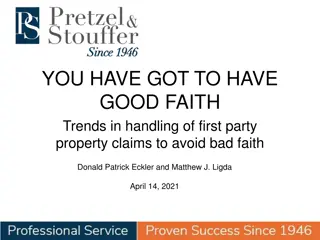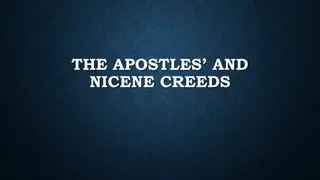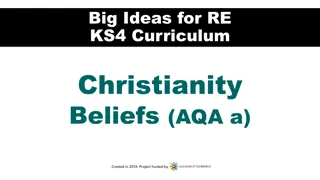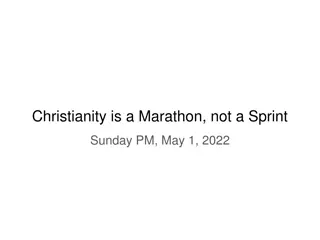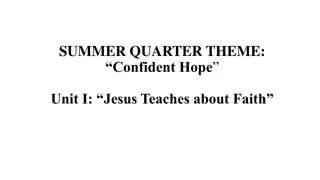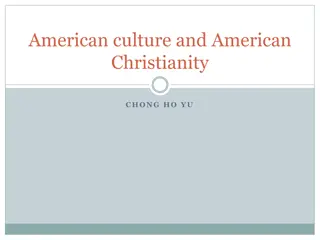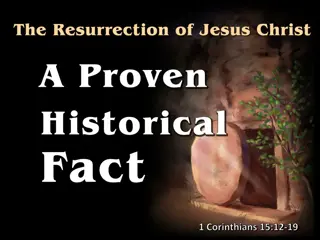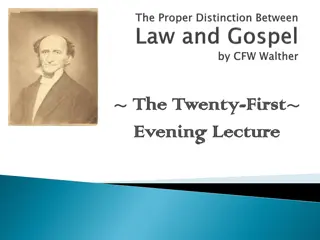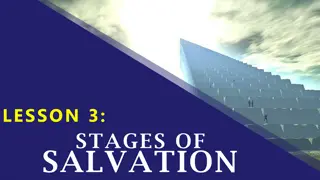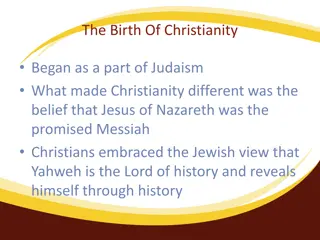Understanding Justification by Faith in Christianity
The study of Christianity delves into the complex relationship between faith and works, particularly focusing on the concept of justification by faith. Explore the significance of Martin Luther's teachings on justification and the impact of his ideas on the Protestant Reformation.
Download Presentation

Please find below an Image/Link to download the presentation.
The content on the website is provided AS IS for your information and personal use only. It may not be sold, licensed, or shared on other websites without obtaining consent from the author. Download presentation by click this link. If you encounter any issues during the download, it is possible that the publisher has removed the file from their server.
E N D
Presentation Transcript
THE STUDY OF CHRISTIANITY Faith and Works https://spaces.hightail.com/space/0sqMR/files/fi-5114cd53-8c8a-45db-9e25- a27848a321ba/fv-f4147e82-5df0-4eb5-8372- 2b11e7ed0397/Theme%203A%20What%20is%20Justification%20by%20Faith%20- %20%20by%203%20Minute%20Theology%20from%20Youtube.mp4
Recap What do we know already about Christianity? From Christianity Theme 1 and 2 From Philosophy From Ethics
If you were in charge of who gets to heaven, what qualities and characteristics would you look for?
Justification Read the following and answer the questions below What is justification and why is it an issue? One of the greatest problems for Christian believers is that of justification - Justification means being made righteous in the sight of God. The idea of justification links with the belief that we are, saved from our sins, at the day of judgement. The deep rooted question is though how are we saved and by what? The first dilemma is easily resolved by looking to the death and resurrection of Christ. Christians believe that Christ was crucified, died and was buried as ransom for the sins of humanity. It is through this sacrifice that our sins are forgiven and we have the promise of eternal life. There must, however be more to it than this. Salvation, for many, is not just about Christ s sacrifice, but about the part we play in our salvation. We are going to consider what do Christians have to do to ensure their salvation?
Martin Luther and Justification by Faith alone. Read and listen Martin Luther (1483-1546) https://www.youtube.com/watch?v=rZ3AFZXXX-k Luther was a German theologian whose writings inspired the Protestant Reformation. Martin Luther was born on 10 November 1483 in Eisleben. His father was a copper miner. Luther studied at the University of Erfurt and in 1505 decided to join a monastic order, after having a religious experience, becoming an Augustinian friar. He was ordained in 1507, began teaching at the University of Wittenberg and in 1512 was made a doctor of Theology. In 1510 he visited Rome on behalf of a number of Augustinian monasteries, and was appalled by the corruption he found there. Luther became increasingly angry about the clergy selling 'indulgences' - promised remission from punishments for sin, either for someone still living or for one who had died and was believed to be in purgatory. On 31 October 1517, he published his '95 Theses', attacking papal abuses and the sale of indulgences. Luther had come to believe that Christians are saved through faith and not through their own efforts. This turned him against many of the major teachings of the Catholic Church. In 1519 -1520, he wrote a series of pamphlets developing his ideas - 'On Christian Liberty', 'On the Freedom of a Christian Man', 'To the Christian Nobility' and 'On the Babylonian Captivity of the Church'. Thanks to the printing press, Luther's '95 Theses' and his other writings spread quickly through Europe.
Martin Luther and Justification by Faith alone. Read Martin Luther (1483-1546) In January 1521, the Pope Leo X excommunicated Luther. He was then summoned to appear at the Diet of Worms, an assembly of the Holy Roman Empire. He refused to recant and Emperor Charles V declared him an outlaw and a heretic. Luther went into hiding at Wartburg Castle. In 1522, he returned to Wittenberg and in 1525 married Katharina von Bora, a former nun, with whom he had six children. Luther then became involved in the controversy surrounding the Peasants War (1524 - 1526), the leaders of which had used Luther's arguments to justify their revolt. He rejected their demands and upheld the right of the authorities to suppress the revolt, which lost him many supporters. In 1534, Luther published a complete translation of the bible into German, underlining his belief that people should be able to read it in their own language. The translation contributed significantly to the spread and development of the German language. Luther's influence spread across northern and eastern Europe and his fame made Wittenberg an intellectual centre. In his final years he wrote polemics against the Jews, the papacy and the Anabaptists, a radical wing of the reforming movement. Luther died on 18 February 1546 in Eisleben.
Johann Tertzel The sale of indulgences
What did Luther say? https://www.youtube.com/watch?v=1o8oIELbNxE (first 8 minutes) Read page 2 of Booklet 1 Write a summary of Luther s ideas about justification by faith alone
SET TEXTS: Biblical references you need to know! Romans 1:17, 5:1; Galatians 2:16; Ephesians 2: 8-9; James 2:24 Romans 1:17 16For I am not ashamed of the gospel, because it is the power of God that brings salvation to everyone who believes: first to the Jew, then to the Gentile. 17For in the gospel the righteousness of God is revealed a righteousness that is by faith from first to last,[e]just as it is written: The righteous will live by faith. Right
Romans 5:1 Peace and Hope Romans 5:1 Peace and Hope 5 Therefore, since we have been justified through faith, we[a]have peace with God through our Lord Jesus Christ, 2through whom we have gained access by faith into this grace in which we now stand. And we[b]boast in the hope of the glory of God. 3Not only so, but we[c]also glory in our sufferings, because we know that suffering produces perseverance; 4perseverance, character; and character, hope. 5And hope does not put us to shame, because God s love has been poured out into our hearts through the Holy Spirit, who has been given to us. Just
Galatians 2:16 2 We who are Jews by birth and not sinful Gentiles16know that a person is not justified by the works of the law, but by faith in Jesus Christ. So we, too, have put our faith in Christ Jesus that we may be justified by faith in[d]Christ and not by the works of the law, because by the works of the law no one will be justified. Know
Ephesians 2:8-9 8For it is by grace you have been saved, through faith and this is not from yourselves, it is the gift of God 9not by works, so that no one can boast. Grace
Luthers rejection of James 2:24 a person is justified by works and not faith alone. James 2:24 Luther claimed the epistle of James was an Epistle of straw What do you think he meant by this?
Tasks Get into pairs: One of you needs to be Luther and the other needs to be Johann Tertzel. You need to be prepared to defend you belief in response to the following statement: You cannot be saved by faith alone . Explain why Luther believed in justification by faith alone To what extent do you agree with Luther that indulgences was an abuse?
The Council of Trent as a response to Luther 1545-1563 The council was held to consider the Catholic churches response to the Reformation. Faith and works It came to the conclusion that good works are required for justification and humans can t bring their own salvation, they must cooperate with the grace of God. Baptism God s gift of grace Eucharist, penance and good works
Starter In pairs one of you write down as much as you can remember about Luther and Sola Fide and the other write down everything you can remember about how the Catholic Church responded to Luther s criticisms at the Council of Trent. Remind each other!
How did Protestants respond to the Council of Trent? Think Pair- Share: How do you think Protestants would respond to the Catholic Church s solution that faith and works are necessary for salvation? Read and highlight the booklet.
Consolidation Create a table with three columns- in column 1 insert the questions on justification that the Council of Trent attempted to answer. In column 2 insert Trent s response. In column 3 insert the Protestant criticism of Trent s response. Questions on Justification Council of Trent s response Protestant criticism of Trent
Another perspective Ed Parish Sanders (born 18 April 1937) is a New Testament scholar and one of the principal proponents of the "New Perspective on Paul". He is a major scholar in contemporary scholarship on the historical Jesus, and he contributed to the view that Jesus was part of a renewal movement within Judaism. He has been Arts and Sciences Professor of Religion at Duke University, North Carolina, since 1990. He retired in 2005. Sanders is a Fellow of the British Academy. In 1966 he received a Th.D. from Union Seminary in NYC. In 1990 he received a D. Litt. from the University of Oxford and a Th.D. from the University of Helsinki. He has authored, co-authored or edited 13 books and numerous articles. He has received a number of prizes, including the 1990 University of Louisville and Louisville Presbyterian Theological Seminary Grawemeyer Award for the best book on religion published in the 1980s for Jesus and Judaism.[2]
E.P Sanders in booklet In his Paul and Palestinian Judaism (1977), E.P. Sanders argues that the Jewish religion, in which Paul had been brought up, was not simply a salvation by works religion. On the contrary, there was in Judaism a pattern of religion , which Sanders calls covenental nonism. This was the Jewish belief that God had instigated a covenant of grace with them, which made them a chosen nation and gave them a special status. They maintained their status in the covenant, however, only by obeying God s commandments. The purpose of keeping God s law was therefore to maintain the status. The status itself was a gift, not a reward for obedience. So Jews entered the covenant by grace and stayed in by works. This, Sanders argues, was the normative Jewish view in Paul s time. Sanders sets Paul's theology in this light. He maintains that Paul worked his way from solution to problem. The solution is that in Jesus God has acted to save the world. The problem therefore, must be that the world is in need of salvation. But God also gave the Mosaic Law. If Jesus is given for salvation, it must follow that the Mosaic Law was not. The problem with the Mosaic Law was not that it failed to make those who kept it righteous, but that it gave them the wrong kind of righteousness. It excluded Gentiles and led the Jews to boast in their ethnicity and election as the people of God. Paul realised that people are justified snot through the Mosaic Law but through the cross of Jesus. The justification that Jesus achieved for men and women was an act of God s grace. It was not earned by humankind. It can only be maintained, however, when men and women respond in gratitude, keeping God s commandments and entering into a mystical participation in Jesus. In Sander s words Christ came to provide a new Lordship for those who participate in his death and resurrection , be they Jews or Gentiles. Thus, Christians enter the new covenant by baptism, but must thereafter be made righteous by faith.
Criticism of Sanders theory Some theologians have criticised Sanders theory on the grounds that: It uses non-biblical, rabbinic sources to over-ride biblical teaching. It explains away contradictory evidence; e.g. the rabbinic literature of Paul s time contains ample evidence of a Jewish belief in righteousness by works. It fails to address the problem of self-righteousness - people who believe themselves morally superior to their peers because they adhere strictly to God s commandments.
Task How similar is what Sander s says to the Roman Catholic Church s teaching on justification?
Questions (a) Examine Luther s arguments for justification by faith alone. [20] (b) Good deeds are necessary for salvation. Evaluate this view. [30]
Planning Ideas a) Examine Luther s arguments for justification by faith alone. [20] Introduction what does Justification mean? Why was it an important issue? Go though Luther s arguments for justification by faith alone. What biblical sources did he rely on? Explain his reasons for arguing this point in detail.
Planning Ideas DIL Read the AO2 essays in the booklet and extra resources (b) Good deeds are necessary for salvation. Evaluate this view. [30] Create an essay plan Why are good deeds necessary for salvation Council of Trent. Why is faith the only thing that gives you salvation? - Luther How convincing are these arguments? Is there a third way? Could faith and works be necessary? Sanders
Eduqas resources on evaluating Luther AO2 skills and information Read the answers in the additional booklet Write your own plan or answer to the questions It is by both faith and works that a person is justified. Evaluate this view The New Testament letters support the view that justification is by faith alone. Evaluate this view
